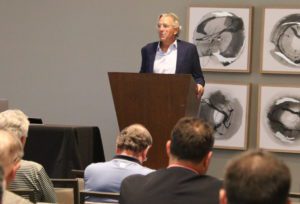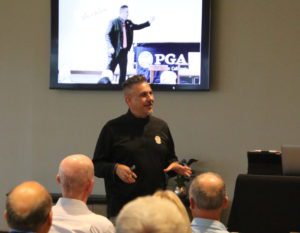Symposium Provides Plenty to Think About
By Bruce Berlet
CROMWELL, Conn. (September 9, 2021) – If you wanted to know about virtually anything to do with the business side of golf, the Tournament Players Club at River Highlands was the place to be on Thursday.
Three heavyweights in the industry proficiently presented plenty of ways to approach the game that had to be beneficial to the 45 owners, general managers, finance chairmen, directors of golf and professionals who attended the Golf Course Business Symposium for Connecticut and Western Massachusetts golf course operators.
The worthwhile offerings were delivered by Ted Eleftheriou, the Vice President of Player Development and Engagement for the National Golf Foundation; Seth Waugh, Chief Executive Officer of the PGA of America; and Jim Remy, former PGA of America President and current Career Services Consultant for the Connecticut and New England PGA Sections.
The two-hour session did indeed prove beneficial for those who attended the symposium.
“You get a lot of networking and learn about a work-life balance from others at something like this,” said Andrew Campbell, the head pro at the Black Hall Club in Old Lyme who last month received the Section’s highest honor, the Professional of the Year Award.
“Ted and Seth offered two different schools of messaging, and anytime there’s an opportunity to learn something, especially for your board of directors, it’s certainly worthwhile, especially when labor shortages are not short-term for the industry.”
Eleftheriou shed light on ways to sustain player engagement and market for new customers. But his most telling thought was a bit of a warning.
“If we don’t take care of our business, it’s going to drift,” Eleftheriou said. “If you don’t pay attention to the ‘rip,’ it will take you out to sea. You have to be aware of situations, so you market differently. And don’t keep your head down in the office so the waves can bring you back in.”
Eleftheriou said people have a lot of reasons for playing golf, which is good for so many reasons such as having fun, competition and camaraderie. But taking care of the business end of the game is paramount because the economic impact on Connecticut is more than $1 billion a year. Despite the pandemic, the number of rounds in Connecticut increased from 4.99 million in 2019 to 5.89 million in 2020.
“Over the past three years, more courses have closed than opened in the country because they’ve had difficulty surviving in a lot of areas because of the pandemic,” Eleftheriou said. “But the number of rounds rebounded to 502,000,000 by June 2020, a 20 percent leap over 2019. And the number of junior golfers increased by 630,000, an increase of 24 percent, and women participation was up 450,000.”
Eleftheriou said the top three reasons that golf participation increased are the outdoor environment, a positive response from the media and people working from their home.
“We have to make the product more attractive and market it properly by actively creating personal relationships with golfers and the community,” Eleftheriou said. “The five criteria for growing the game are the right person with the right mindset, the right demographic, golf course instruction, making golf your thing, and invite, introduce and continue the program.”
Section president Howie Friday, the head pro at Stanley Golf Course in New Britain, called the symposium “terrific.”
“I enjoyed listening to Ted,” Friday said. “His enthusiasm and insight into the industry are unmatched.”
“Talking about how to retain our customers is something that I believe is critical to our success moving forward.”
“And, Seth Waugh is a wealth of knowledge,” Friday said. “He really understands what PGA Professionals are going through. Talking about a work/life balance was great to hear from our leader and is something that needs to happen in our industry if we are going to retain good people and thrive.”
Waugh is the former Chief Executive Officer of Deutsche Bank Americas who joined the PGA of America as CEO in September 2018. He guides the business and overall strategy of one of the world’s largest sports organizations, serving the organization’s nearly 28,000 PGA professionals.
Waugh said the golf business has to be “vigilant” to sustain or improve its position.
“We’re in a huge bull market so we have a generational chance to grow the game,” Waugh said. “We have an alphabet soup of organizations like the PGA of America, PGA Tour, LPGA and R&A so we have to cooperate and make golf look like the rest of the world. We have to make a collective effort to lead people to the game and make sure to create a great experience by maximizing a facility.”
Eleftheriou’s experiences include working as a Systems Programmer for General Electric, playing in “metal” bands since the age of 14, becoming a freelance producer in the film industry and a PGA member, overseeing the creating and operation of 41 Nike Golf Learning Centers, owning and teaching at his own successful golf academies and working for the PGA of America creating and delivering workshops that assisted professionals and business owners grow their businesses by recognizing and delivering value.
“You can’t wait for customers to find you,” Eleftheriou said. “You have to take ownership, take advantage of help from the PGA of America and contact people in the community like the police, churches, car dealerships or the Rotary Club. The golfer ‘experience’ has to be different, informative, enjoyable and entertaining. They should practice and play with pros to help reinforce positives.”
Remy, a PGA of America member since 1984, was the Vice President and General Manager of the Okemo Golf Division at the Okemo Valley Golf Club in Ludlow, Vt., for more than 20 years. He was elected the 36th PGA president in 2008.
Remy said his consultant job is to help all PGA of America members, which is what he does every day. He stressed finding help and creating a healthy work/life balance for key staff members with the biggest complaint being a lack of help.
“There’s a hiring crisis in America, so you have to work as a team,” Remy said. “It’s more important to attract and refer the best help to try to provide them with the right environment, and golf pros have to have a vacation (in the summer). You have to be creative, and we all have to work together. Hopefully we can move past all of the trials and tribulations that we’ve had to deal with the past few years and continue to move forward.”
# # #

